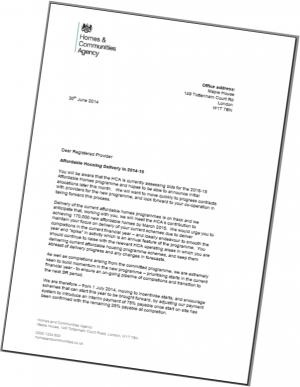



In a recent letter (see attachment), the Homes and Communities Agency has changed its Start-on-Site tranche from 50% to 75% in order to encourage sites to come forwards sooner rather than later. This is no doubt in part motivated by a desire to avoid a repeat of the hiatus in delivery that opened up between its previous programme and the current 2012-15 progamms.
The letter makes clear that this applies to schemes within the existing programme as well as the 2015-18 programme.
Where applicable, we will pay the start on site tranche for all schemes due to deliver starts in the current financial year, with the exception of the Care and Support specialist housing programme (which is subject to different budgets).
This will include schemes under the new AHP 2015-18 programme where start on site can be achieved this financial year.
Short-term measure
The change applies only up to the end of March 2015 after which presumably it reverts to a 50% tranche on Start-on-Site.
This presents something of a conundrum to providers under the 2012-15 programme, who will currently be having to assess the risks attached to starting projects that might not complete by the end of March 2015. There remains no change to the absolute cut-off-date of March 2015. The good news is that Empty Homes Providers can claim 75% at SOS on any new projects. The bad news is that if they don't complete them they will continue to be unable to claim grant and the grant already paid to them may be forfeit.
Where does the SOS money come from?
The question arises what the HCA is using to fund 2015-18 schemes that achieve Start-on-Site during the remainder of 2014-15. The presumed answer is "underspend from the 2012-15 programme" as presumably the HCA cannot draw down money early from the Treasury for its 2015-18 programme. If this is the case, it creates a somewhat counter-intuitive position whereby you can get funded to start a project that "belongs" in the 2015-18 programme now, with no problem about where the completion date lies, but you cannot get funded or take the risk of starting a project that "belongs" in the 2012-15 programme (inlcuding all the Empty Homes projects) if it is not going to complete by end of March 2015 (or indeed earlier to satisfy some audit requirements).
Switching Programmes
For providers in the current main programme - and for the HCA itself - there seems to be an obvious route to take for a number of projects that, for risk avoidance reasons, might otherwise not proceed in the current year, namely to switch them from the 2012-15 programme to the 2015-18 programme. Verbal enquiries from providers about this option have been met with refusal on the basis that the main bidding round for 2015-18 has already closed. This raises the question of whether or not there is flexibility to indulge in a quick spot of "market engagement".
For Empty Homes projects is less clear as there is no "Empty Homes" programme within the 2015-18 programme, although products such as Lease and Repair and Purchase and Repair are available. The other point is - where does the underspend that the HCA might want to use come from, assuming this is the source of the forward funding for 2015-18? An obvious answer would be, in part, from the Empty Homes programme which we think is probably underspending. So rather than facilitating such an option, the HCA might be more inclined to let empty homes projects die and shift money to what, to them, are more attractive schemes.
A simple solution to maintain a decent stream of delivery would be the implementatoin of a blanket policy whereby any 2012-15 scheme that could acheive start-on-site by say end of December 2014 can automatically get transferred into the 2015-18 programme on the same terms and conditions as are applicable to the 2012-15 programme. This would bring significant flexibility to Empty Homes Programme providers, though it presumably questions are being raised by providers within the mainstream HCA programme. A blanket policy would avoid a situation where the HCA was cherry-picking the schemes it wished to allow to roll forward - potentially at the expense of the Empty Homes programme.
